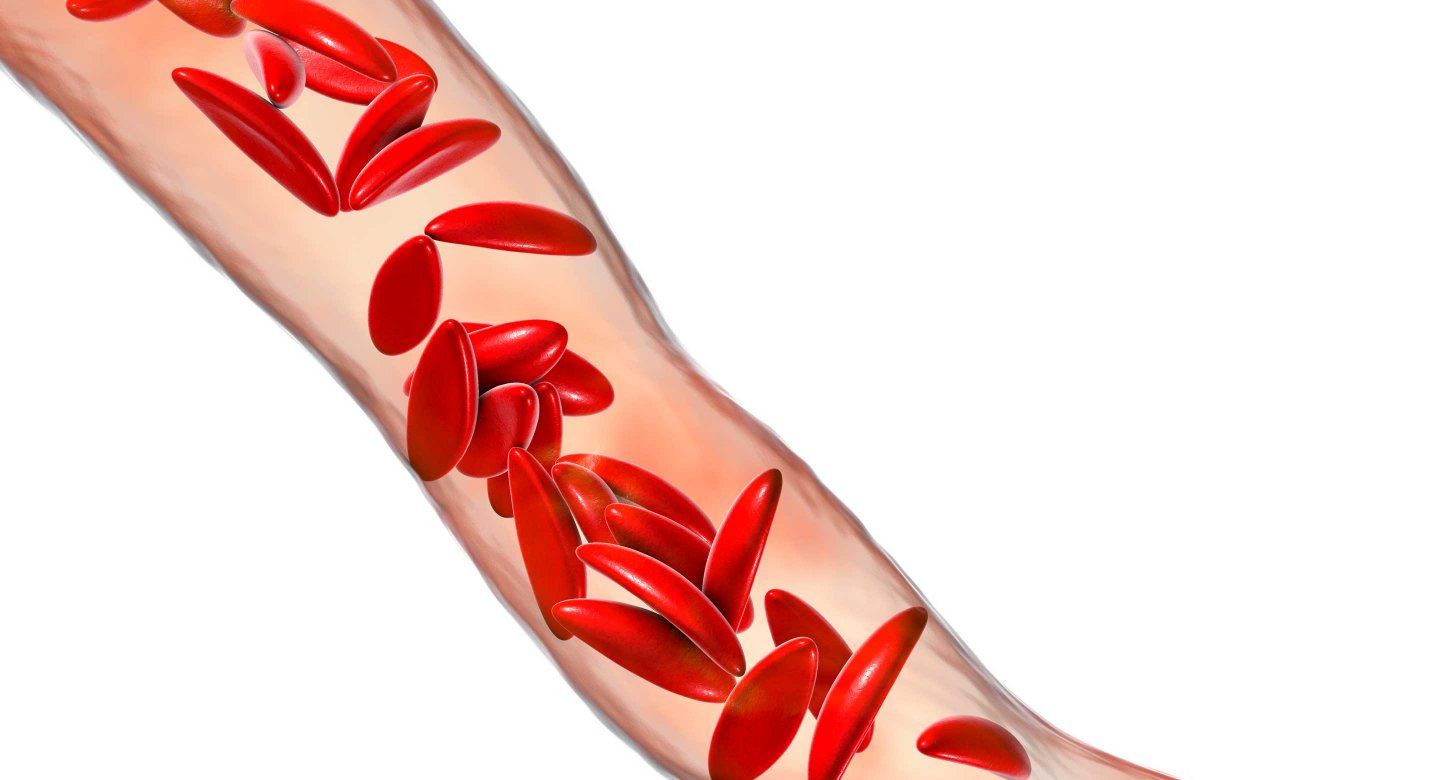This article is archived and only made available for historical reference. If you’d like to discover UCSF’s most recent advances in research, education and patient care, please visit the UCSF News Center.
Archive: Patients with Sickle Cell Increase Healthy Blood Cells in New Drug Trial
Phase 3 HOPE Trial Finds Improved Anemia, a Major Risk Factor for Organ Failure and Early Death
A Phase 3 study has found that patients with Sickle Cell Disease (SCD) who took a daily dose of the novel drug voxelotor had less anemia and made healthier red blood cells than patients receiving a placebo.
The 17-month HOPE trial — for Hemoglobin Oxygen Affinity Modulation to Inhibit HbS PolymErization — was designed to evaluate the safety and efficacy of the hemoglobin polymer-inhibitor for adolescents and adults with SCD. The test included three dosage levels, including a placebo group.
The results, published June 14, 2019, in The New England Journal of Medicine, found that 51 percent of the patients receiving the higher dose of voxelotor had a significant increase in hemoglobin at 24 weeks of therapy.
Sickle cell disease affects approximately 100,000 individuals in the United States and decreases life expectancy by approximately 30 years, according to the researchers. It is a hereditary disorder caused by a defect in a gene that makes hemoglobin, a critical protein in red blood cells that distributes oxygen throughout the body. The de-oxygenated hemoglobin causes red blood cells to be sickle-shaped, rather than round. The misshapen red blood cells break apart easily and block blood vessels, causing anemia, severe pain and organ damage that can lead to early death.
“Chronic organ failure, which is predicted by the severity of anemia, is a leading cause of death for patients with SCD,” said Elliott Vichinsky, MD, the study’s lead researcher, medical director of hematology/oncology at UCSF Benioff Children's Hospital Oakland, and professor at UC San Francisco. “These patients are susceptible to strokes, renal failure and other complications that lead to early death. We believe this drug has the potential to decrease chronic organ failure in patients with this condition.”
The 274 trial participants, ranging from 12 to 65 years old, were from 60 institutions across 12 countries. All participants had confirmed sickle cell disease and most had sickle cell anemia. Participants were divided into three groups that received voxelotor in doses of 1500 mg, 900 mg and no medication, respectively. Researchers randomized participants in each group to receive their dosages once daily.
Participants went through a screening period of 28 to 35 days, a treatment period of up to 72 weeks and an end-of-study visit about four weeks after receiving the last dose of the study drug. Stratification factors included the participants’ age, geographic region and whether they were currently on hydroxyurea, a drug commonly prescribed to patients with SCD.
In the analysis, 51 percent of the patients assigned to the higher dose had a significant hemoglobin response at 24 weeks vs. 7 percent of the placebo group, with 60 percent overall positive response in the group that received the drug. Importantly, 41 percent of the patients on the highest dose (1500 mg) reached hemoglobin levels of more than 10g/dL at 24 weeks. A normal hemoglobin count ranges between 11.5 to 17.5 g/dl, depending on age and gender.
“The inhibitor significantly increased hemoglobin levels and reduced the incidence of acute anemic episodes, compared with the sickle cell placebo group,” Dr. Vichinsky said in the report. There was significant improvement in the health of red cells within two weeks of therapy, as indicated by decreases in bilirubin, reticulocyte counts, and other markers of hemolysis.
Co-Authors: The paper includes 23 co-authors from 18 institutions, including first and corresponding author Elliott Vichinsky MD, from UCSF Benioff Children’s Hospital Oakland. Additional co-author institutions include the Global Blood Therapeutics, South San Francisco, CA; University of Tennessee, Memphis, TN; Cincinnati Children’s Hospital, Cincinnati, OH; University of Cincinnati, Cincinnati, OH; Kenya Medical Research Institute, Kisumu, Kenya; Cairo University, Cairo, Egypt; Alexandria University, Alexandria, Egypt; Harvard Medical School, Boston, MA; Sultan Qaboos University, Muscat, Oman; Children's Healthcare of Atlanta, Atlanta, GA; Columbia University Medical Center, New York, NY; Barts Health NHS Trust, London, UK; Homerton University Hospital NHS Foundation Trust, London, UK; University of Illinois at Chicago, Chicago, IL; University of Alabama, Birmingham, AL; American University of Beirut Medical Center, Beirut, Lebanon; Guy’s and St. Thomas’ NHS Foundation Trust and King’s College, London, UK. The full list of authors and affiliations can be found in the paper.
Funding: Funding was provided by Global Blood Therapeutics. Medical writing assistance was provided by Emily C. Casey, PhD (ApotheCom), supported by funding from Global Blood Therapeutics.
Disclosures: Global Blood Therapeutics manufactures Voxolotor, the drug primarily used in this study. Full disclosures can be found in the paper at NEJM.org.
About UCSF Benioff Children’s Hospitals: UCSF Benioff Children’s Hospitals are among the nation’s leading pediatric specialty hospitals, according to U.S. News & World Report. Their expertise includes the full range of pediatric conditions, including cancer, heart disease and neurological disorders, as well as the care of critically ill newborns. The hospital campuses, in San Francisco and Oakland, are recognized worldwide for their innovative research aimed at treating and preventing pediatric diseases. They are part of UCSF Health, whose adult hospital ranks among the top 10 medical centers nationwide. UCSF Health’s hospitals serve as the teaching hospitals for the University of California, San Francisco, a national leader in biomedical research and graduate-level health/sciences education. Visit www.ucsfhealth.org.
